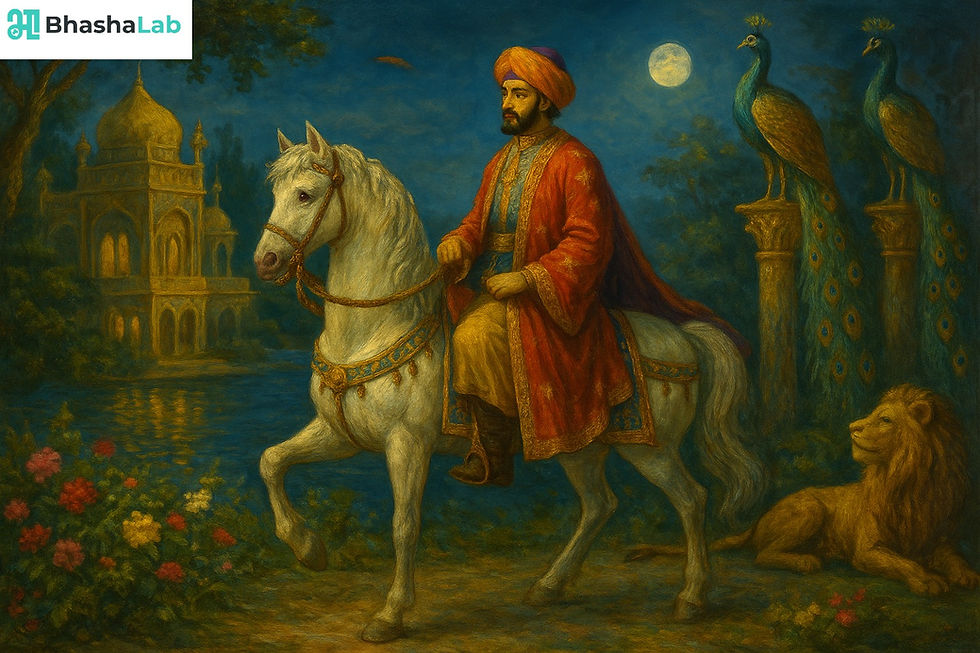3.1 Tartary – Class 7 – Balbharati
- Aug 27, 2025
- 4 min read

Author: Walter de la Mare
Genre: Imaginative / Fantasy Poem
Textbook: English Balbharati – Class 7
Board: Maharashtra State Board
English Summary
The poem Tartary by Walter de la Mare is an imaginative dream of a land where the poet would be its sole lord. He wishes to rule over a kingdom with ivory beds, golden thrones, and peacocks, tigers, and fishes decorating his land. Trumpeters would announce his meals, while lamps glowing like honey and wine would light his evenings. Music from harps, flutes, and mandolins would fill his court. He would wear a robe of colourful beads and carry a scimitar (sword) while riding a chariot drawn by zebras through forest glades. Tartary would be filled with silver rivers, hills, forests, valleys, starry skies, fragrant breezes, lakes, and citron-trees. The poem paints a picture of wealth, splendour, and natural beauty, reflecting the poet’s wishful fantasy of a perfect land.
Theme / Central Idea
The poem highlights the human desire for beauty, splendour, and power. It shows how imagination can create a dreamland full of riches, music, nature, and luxury.
Word Meanings
Word | Meaning |
Flaunt | Show off proudly |
Scimitar | Curved sword |
Glade | Open space in a forest |
Citron | A kind of citrus fruit tree |
Mandoline | A stringed musical instrument |
Vale | Valley |
Slant | Tilt or move at an angle |
Athwart | Across, in a slanting direction |
Wane | To fade away or decrease |
Exotic | Unusual, from a foreign place |
Figures of Speech (with examples)
Simile – “Yellow as honey, red as wine” – lamps compared to honey and wine.
Imagery – “Her trembling lake like foamless seas” – vivid picture of nature.
Alliteration – “White and gold and green they’d be” – repetition of ‘g’ sound.
Consonance – “Rivers silver-pale” – repetition of consonant sounds.
Metaphor – The whole land of Tartary is described as a symbol of dream and splendour.
Rhyme Scheme
The rhyme scheme of the poem is abab throughout the stanzas.
Personal Response Questions (5)
Would you like to live in a land like Tartary? Why?
I would like to live in a land like Tartary because it is filled with beauty, music, and luxury. The forests, rivers, and stars make it a magical place of joy and peace.
What is your favourite image in the poem?
My favourite image is of the “trembling lake like foamless seas.” It creates a peaceful and beautiful picture of calm waters that seem endless and enchanting.
What lesson does the poem give about imagination?
The poem shows that imagination can transport us into dreamlands. It teaches us that creativity helps us escape reality and explore beauty, splendour, and joy.
How does music add charm to the poet’s fantasy?
Music from harps, flutes, and mandolins makes the dreamland lively and cheerful. It symbolises harmony, luxury, and celebration in Tartary.
Do you think nature plays an important role in Tartary? How?
Yes, nature plays a very important role because rivers, hills, forests, breezes, stars, and trees enrich Tartary. They provide splendour and balance between wealth and natural beauty.
True or False (5)
The poet dreams of being the Lord of Tartary. → True
Tartary has no music or joy. → False (It is full of music and happiness.)
The lamps in Tartary shine yellow as honey and red as wine. → True
Zebras are described as drawing the poet’s car. → True
The poet describes Tartary as a land of poverty. → False (It is full of wealth and splendour.)
Probable Board / Exam Questions (5)
How does the poet imagine his court in Tartary?
He imagines ivory beds, golden thrones, peacocks, music of harp, flute, and mandoline, with lamps shining like honey and wine in his court.
What natural beauty of Tartary does the poet describe?
The poet describes silver rivers, forests, hills, valleys, fragrant breezes, trembling lakes, stars, and citron trees that make Tartary enchanting.
What does the poet wear in his dreamland?
The poet wears a robe of colourful beads in white, gold, and green, and carries a scimitar while riding in a zebra-drawn car.
How are the evenings described in Tartary?
The evenings are filled with shining lamps, glowing yellow as honey and red as wine, while music makes the court cheerful.
What message does the poem Tartary give?
The poem conveys that human imagination has no limits. It shows the desire for a perfect world combining riches, music, and natural splendour.
Appreciation / Reflection Paragraph
Tartary by Walter de la Mare is a beautiful fantasy poem that creates a dreamland of splendour and nature. The vivid descriptions of rivers, forests, lakes, music, and thrones make the poem enchanting. The rhyme and rhythm add to its charm, while figures of speech like simile and imagery make it memorable. The poem reminds us of the power of imagination to create worlds of beauty and joy. It is memorable because it blends natural scenery with the poet’s dream of wealth and harmony.
About BhashaLab
BhashaLab is a dynamic platform dedicated to the exploration and mastery of languages - operating both online and offline. Aligned with the National Education Policy (NEP) 2020 and the National Credit Framework (NCrF), we offer language education that emphasizes measurable learning outcomes and recognized, transferable credits.
We offer:
NEP alligned offline language courses for degree colleges - English, Sanskrit, Marathi and Hindi
NEP alligned offline language courses for schools - English, Sanskrit, Marathi and Hindi
Std VIII, IX and X - English and Sanskrit Curriculum Tuitions - All boards
International English Olympiad Tuitions - All classes
Basic and Advanced English Grammar - Offline and Online - Class 3 and above
English Communication Skills for working professionals, adults and students - Offline and Online
Contact: +91 86577 20901, +91 97021 12044
Mail: info@bhashalab.com
Website: www.bhashalab.com





Comments